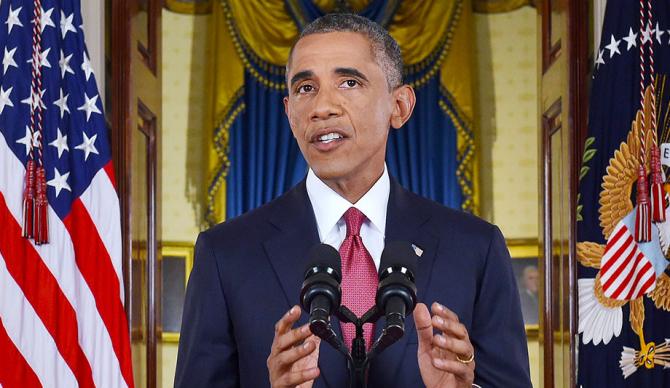
Despite polls this week showing that the public is losing confidence in President Barack Obama’s handling of foreign policy, you can put me down in that dwindling category of folks who, up to now, actually think that his handling of the threat from the Islamic State in Iraq and Syria—ISIS for short—has generally been about right.
The insertion, in the last several weeks, of around a thousand U.S. special operators; 154 targeted airstrikes; humanitarian-aid drops to Yazidis; military coordination with Iraqi Kurdish forces; an insistence that Iraq’s Shiites dump former Prime Minister Nouri al-Maliki; and pressure (not very successful, so far) put on Sunni powers like Saudi Arabia to intervene constructively struck me as about the right mix.
It’s been, essentially, this: We can’t solve the Middle East, but we’ll do what we can to help.
But I’m not sold on the plan Obama laid out Wednesday night for extending the ISIS fight into Syria. He struck the right note of resolve in response to the beheadings of American journalists, stating, “If you threaten America, you will find no safe haven.” And he clarified that his goal is to “degrade and ultimately destroy” ISIS.
He also avoided the overheated rhetoric of the George W. Bush presidency. But to my mind, the next phase of war that he outlined is a notch past the circumspect George H.W. Bush approach that he’s taken up to now. And even if we see some initial successes—even if the president has a more intricate game plan in mind that we’re not privy to—his speech didn’t convincingly lay out the case. Here’s why:
Syria?
If you add up the threat ISIS posed to Iraqi Kurdistan, the threat to our consulate in Erbil and the threat to the Yazidi minority and then add Gen. Colin Powell’s “You broke it, you bought it” mantra, Obama had a pretty solid basis for intervention … in Iraq.
But now the president is talking about going into Syria. And the fact that ISIS operates on both sides of the Iraq-Syria border doesn’t change the fact that most of those same conditions don’t exist. Now we’re looking at launching airstrikes in a country that’s in the midst of a civil war, where no side is aligned with us and we don’t have a well-defined endgame. And Obama plans to “train and equip” other Syrian opposition groups, even though a few weeks ago he said it was a “fantasy” to think that arming them sooner would have improved the overall picture in Syria.
Congress?
I think he’s making a mistake by not insisting on a congressional vote for an extended mission. Right now he’s within the parameters of the War Powers Act. But for a prolonged campaign, President Obama should listen to then-Sen. Obama, who once argued, “History has shown us time and again” that “military action is most successful when it is authorized and supported by the legislative branch.”
Members of Congress don’t want to vote on it because if it breaks bad, they want to preserve an “I told you so.” Which is all the more reason, politically, that Obama shouldn’t let what is supposed to be an equal branch of government off the hook.
Coalition?
Obama said twice that he’s put together a “broad coalition” of partner nations that will go to war with us against ISIS, but as the American Conservative’s Daniel Larison notes, the U.S. “still cannot count on support from its sole NATO ally in the region”—Turkey, a country that borders Iraq and Syria—to engage militarily. And the United Kingdom’s prime minister, David Cameron—who got attaboys all around for the stern talking-to he delivered to ISIS in front of Parliament—is prepared to back us in Iraq but says that in Syria, we’re on our own.
No one’s got a crystal ball here. And there are persuasive arguments both for and against the action plan the president is taking. Up to now, though, Obama has mostly resisted the “do something” chorus that’s always clear about wanting him to do more, but pretty sketchy when it comes to saying what, exactly, it wants him to do.
It was the right approach in Ukraine—eschewing calls to confront Russia head-on in favor of a gradual program of economic sanctions that eventually helped motivate Ukrainians to fight for themselves. This time, I’m wondering if Obama runs the risk of doing just enough to encourage his “broad coalition” that they should hedge their bets and let Americans do most of the heavy lifting.















